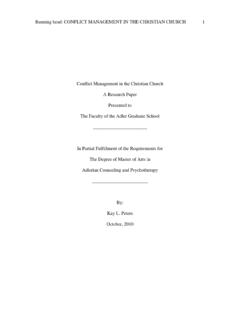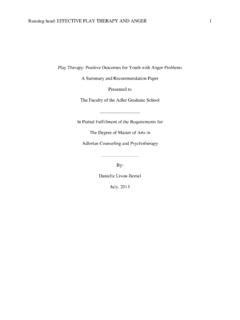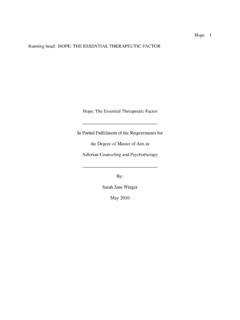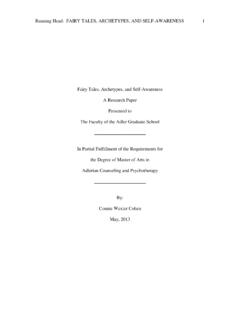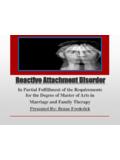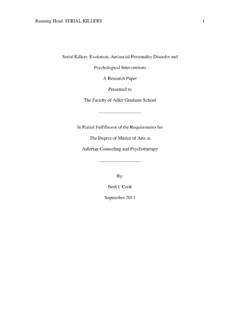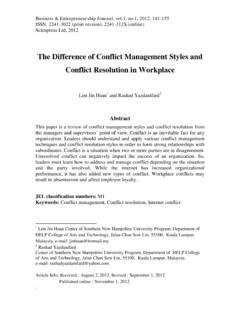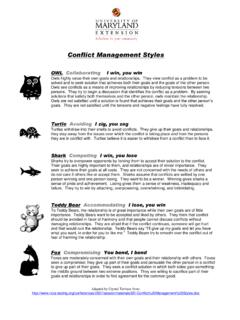Transcription of CONFLICT MANAGEMENT IN THE CHRISTIAN CHURCH
1 Running head: CONFLICT MANAGEMENT IN THE CHRISTIAN CHURCH 1 CONFLICT MANAGEMENT in the CHRISTIAN CHURCH A Research Paper Presented to The Faculty of the Adler Graduate School _____ In Partial Fulfillment of the Requirements for The Degree of Master of Arts in Adlerian Counseling and Psychotherapy _____ By: Kay L. Peters October, 2010 CONFLICT MANAGEMENT IN THE CHRISTIAN CHURCH 2 CHAPTER 1. INTRODUCTION Introduction to the Problem Being a CHRISTIAN pastor today is more difficult than anytime in memory. This century witnessed the collapse of the CHRISTIAN consensus that held American culture together for centuries. The moral relativism that accompanies a secular view of reality deeply affects the work of the CHURCH and its leadership (Fisher, 1996).
2 Far too many good pastors are being driven out of ministry, leaving thousands of churches weak and vulnerable to spiritual attack. Without good leadership denominational factions multiply, evangelism declines, divorces proceed unrestrained, discipleship loses direction and missionaries are forgotten (Sande, 2004). Congregational CONFLICT , defined as a difference in opinion or purpose that frustrates someone s goals or desires, may occur when those religious and spiritual beliefs are unaligned (Sande, 2004). This misalignment may take on a psychological dimension, since members look to the CHURCH for comfort and reassurance in a rapidly changing and threatening world (Hadden, 1970). Instead of a place of comfort and reassurance, CHURCH CONFLICT can create a battle ground for power struggles of various factions, victimizing the congregation and sabotaging pastoral leadership and CHURCH growth.
3 A pastor is most often forced out of ministry due to lack of success at resolving differences with other people within the CHURCH (Sande, 2004). CONFLICT is not necessarily bad. The Bible, the collection of sacred writings of the CHRISTIAN religion, teaches that some differences are natural and beneficial. Christians believe that God created people as unique individuals, with different opinions, convictions, desires, perspectives, and priorities. When handled properly, disagreements CONFLICT MANAGEMENT IN THE CHRISTIAN CHURCH 3 in these areas can stimulate productive dialogue, encourage creativity, and promote helpful change and growth. The researcher of this study believed that CONFLICT should not be avoided or feared.
4 Can CONFLICT , managed in a way that is not fear-based, result in positive growth for the CHURCH ? This research delved into understanding the factors associated with CHURCH CONFLICT and leadership CONFLICT MANAGEMENT strategies available to pastors. Background of the Study A Christianity Today International exploratory study (Barfoot, Wickman, & Winston, 1997) revealed that the most common causes for forced pastoral exits include: The CHURCH being in a current state of CONFLICT when the pastor arrives; A lack of unity and the presence of factions in the CHURCH ; Poor people-skills on the part of the pastor; Conflicting visions for the CHURCH ; A CHURCH s resistance to change; Power and control struggles; Personality conflicts ; Poor people skills on the part of the pastor.
5 CONFLICT over leadership styles; Dissatisfaction with the pastor s performance; and Theological differences (Barfoot et al., ). CONFLICT MANAGEMENT IN THE CHRISTIAN CHURCH 4 A pastor is most often forced out of ministry due to lack of success at resolving differences with other people within the CHURCH (Sande, 2004). The Christianity Today International study further revealed: Forty-five percent of pastors who were forced out of the CHURCH think they could have done more to avoid being forced out; Resolving CONFLICT was the primary action pastors wished they had taken sooner; and Pastors reported CONFLICT MANAGEMENT as the area of training most lacking in their seminary or Bible college education (Barfoot et al.)
6 , 1997, p. 11). CONFLICT can be the result of a violation of shared expectations, or CONFLICT can result from the clash of two fundamentally different sets of expectations for behavior (Becker, 1999). Previous research shows that intra-congregational conflicts arise over issues of congregational culture, leadership, and denomination (Becker, 1999; Chou, 2008); theology, purpose, and meaning (Hadden, 1970); liberalism versus conservatism (Becker, 1999; Haden, 1970); and beliefs and authority (Hoge, 1976). When any of one these factors are compromised by leadership, it plays a significant role as to why people feel their religious understandings are misaligned and CONFLICT occurs Each year thousands of pastors leave their churches, leading to an astronomical cost of $684 million a year (Sande, 2004).
7 Most congregations have not been properly equipped to deal with CONFLICT , so when a pastor who is equally unprepared in CONFLICT MANAGEMENT enters into such a CHURCH , the stage is set for agonizing CONFLICT and disunity (Sande, 2004). The CHURCH cannot afford to let these losses continue. This study sought to CONFLICT MANAGEMENT IN THE CHRISTIAN CHURCH 5 find a relationship between CHURCH leadership CONFLICT MANAGEMENT style and positive energy growth for unity within the CHURCH . Statement of the Problem This research study conducted multiple assessments to determine if CHURCH leaders understood the significance of their CONFLICT MANAGEMENT style on the congregation and its members. Is it possible to seek unity without demanding uniformity and transform conflicting situations into positive growth opportunities for the CHURCH ?
8 Purpose of the Study The purpose of this study is to determine how strategies of CONFLICT MANAGEMENT by leadership within the CHURCH may impact the overall health of the CHURCH . Correlations among independent variables of CONFLICT MANAGEMENT , education and knowledge, the fear associated with CONFLICT , and the potential for positive growth outcomes were analyzed. Research Question Can CHURCH pastoral leaders use CONFLICT MANAGEMENT , not in a fear-based way, but in a positive growth-producing way for their churches? Nature of the Study The nature of this study consisted of interviewing twenty CHRISTIAN CHURCH leaders from various denominations. This research approach presented three measurable assessments. Seven open ended questions were given with the intent to compare CONFLICT MANAGEMENT to the growth of their CHURCH .
9 The Basis-A Inventory was used to provide insight into how the CHURCH leader approached life s task. The Thomas-Kilmann CONFLICT Mode Instrument assessed each leader s behavior style in CONFLICT situations. These CONFLICT MANAGEMENT IN THE CHRISTIAN CHURCH 6 assessments were measured and compared to identify existing relationships. The demographics of each CHURCH leader are described in Chapter 3. Definition of Terms The following terms listed on Table 1 are related to CONFLICT MANAGEMENT and to the CHRISTIAN CHURCH and are referred to throughout this paper. Table 1. Definitions of Terms Term Definition Bible A book of the sacred scriptures for Christians comprised of the Old and New Testaments (Alexander, 1999, p.)
10 18). Christ: Jesus of Nazareth Held by Christians to be the fulfillment of prophecies in the Old Testament regarding the eventual coming of a Messiah (Alexander, 1999, p. 28). Christians Pertaining to, believing in, or believing in the religion based on the teachings of Jesus Christ (Alexander, 1999. p. 246). Congregational CONFLICT A difference in opinion or purpose that may frustrate an individual s goals or desires when religious and spiritual beliefs are unaligned (Sande, 2004, p. 12). Jesus: Jesus of Nazareth The source of the CHRISTIAN religion was born in Bethlehem shortly before the death of Herod the Great in 4 BC and spent this early life in Nazareth (Alexander, 1999. p. 542). Sin A wrong-doing disobedience, rebellion against God (Alexander, 1999.
